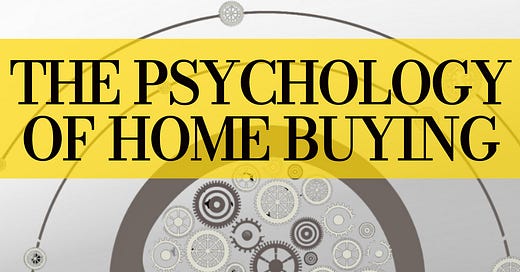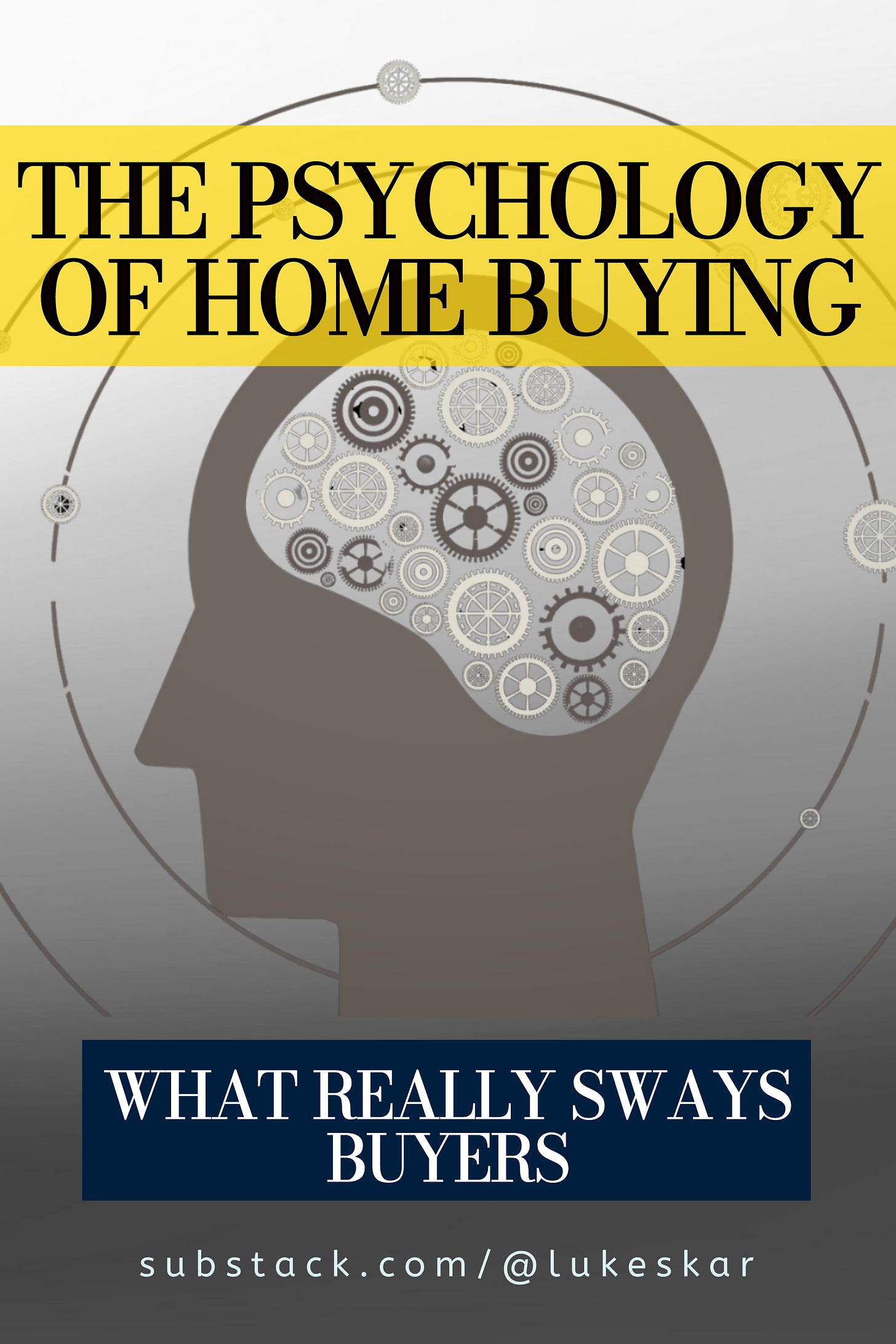Understanding The Psychology Behind Purchasing a Home
Making big changes in your living situation, like buying a home, involves a lot of difficult decisions. You will be linking your future finances to the choices you make in the home-buying process. While you might think you are making rational decisions, this isn’t always true.
Your emotions play a larger role in decision-making than you might expect or want to believe. Psychological factors will influence your purchase decisions, and understanding how this works will help you make better choices.
We look at factors that could sway home buyers into making a decision they regret.
Rational Factors
There are many practical considerations to make when searching for a new home. These include:
Affordability
The size of the mortgage available to you will be one of the most significant factors to consider when searching. Your income and outgoings will determine the mortgage you can afford and prevent you from overstretching your finances.
Location
The location of the home is also going to be very important. You might want to live near family, close to work, or good schools. You might also choose a neighborhood for safety, amenities, or even aesthetic appeal.
Size and Layout
You may need a certain size home for your family. You might also prefer a particular layout, though there is likely more room for compromise.
Condition of the Home
Unless you are looking for a renovation project, you will want to buy a property in good condition. The home inspection should report any issues that could result in costly maintenance and repairs.
Preferences
You might have a clear idea of what your new home will look like. Perhaps you prefer certain design features or styles for the interior and exterior. These style preferences will be important, but it is perhaps something you can compromise on if you have to.
Personal preferences are influenced by the media, society, previous living experiences, and even your childhood. To buy your dream home, you might push your finances further than you should. This is where preferences begin to become more emotional than rational.
While you will have many practical reasons for choosing your next home, emotional factors can have a lot of influence on your choice.
Emotions
Even if you don’t consider yourself to be an emotional person, they could be having more of an effect on your decisions than you would anticipate. The search for your perfect home can involve many ups and downs.
Finding the right home can be exciting, making an offer can cause anxiety, and losing a bidding war can be upsetting. But your emotions can also play more of a role in your decision-making process than you might expect.
Fear of Missing Out
When you find that perfect home, you don't want to lose it. It can feel like this is your only chance to buy the right property for you. FOMO can cause you to offer more than you should for a house.
Becoming Too Attached
If you find somewhere that feels right, you can become too emotionally attached to that idea. Perhaps it reminds you of somewhere you used to live, or you fell in love with some of the features. Whatever the reason, this emotional attachment can cause you to make buying mistakes.
Status
Some home buyers want to impress other people with their home purchases. Treating your home like a status symbol could mean sacrificing important things about the property. It can also lead to overspending, with extreme financial penalties later on.
Peer Pressure
Family and friends might want to offer advice to help you in your search for a new home, but this can go too far. Sometimes, your family might want what's best for them and apply emotional pressure to you.
While this might start as well-intentioned advice, if it's in their best interests, it might not be in yours. This sort of pressure can be difficult to ignore, but it could be better for your future finances and happiness.
Cognitive Bias
While you might hope to be making rational choices when making big financial decisions, that isn't always the case. Cognitive biases are patterns of thinking based on a lack of information, mental shortcuts, or social influences that can be illogical.
When buying a home, a cognitive bias can push you to make an ill-advised decision that could harm your finances.
Confirmation Bias
We all have existing beliefs, and when presented with new information, we filter it through our pre-existing understanding. This creates a tendency to ignore or play down any information that contradicts the existing belief.
When you have decided on a home and paid an earnest money deposit, you believe you have made the right choice. This can lead home buyers to downplay negative aspects of a house uncovered during a home inspection, for instance.
When we encounter information that supports an already-held belief, we may increase its importance in decision-making. This might lead a homebuyer to overly focus on a positive feature of the property while ignoring the red flags.
Anchoring Bias
It is easy to rely too heavily on the first piece of information you are given. In real estate, this anchoring bias can relate to the first listing price of a suitable home that you see. It is very easy to judge other homes based on that first valuation.
However, there's no guarantee that the first price you saw was reasonable for that home. The anchoring bias could make you think other properties are either too expensive or good value when that isn't the case.
Sunk Cost Fallacy
When you invest time, effort, or money into something, it can be hard to change your mind and back out. Walking away from a property is more difficult when you have invested time and money in the home buying process.
As you get closer to the closing date, it might seem like you can’t back out. But if the home inspection uncovers something unexpected, it can be tempting to continue when you have spent money, time, and effort to get to that stage. While this could mean giving up your earnest deposit and wasting money spent on inspections, walking away might be the best option.
The Bandwagon Effect
In a hot market, you can feel pressured to make a quick bid and pay more because that is what others are doing. But doing something just because everybody else appears to be doing it isn’t a rational choice.
Framing Bias
The listing agent wants to present the home in a way that will most attract a buyer. But buying decisions should be made on facts instead of focusing on how that information is presented.
The home can be framed to appear better with careful staging and photography. Potential buyers should look beyond the presentation to see the reality the property offers.
How to Avoid the Psychological Pitfalls When Homebuying
Being aware of what influences your decision-making could prevent a costly mistake. Focusing more on practical requirements can help you avoid buying a house that is wrong for you.
Emotions can be very powerful and easily triggered by the things that happen during the buying process. You can be excited and happy when finding a home, but that can quickly become anxiety if things don't go your way. Your emotions will affect your perception of the situation and, therefore, how you react.
Emotions can change the way you think about things. If someone becomes emotionally invested in a property, they are less likely to get a good deal and are more likely to overlook any negatives. They like the home, so they want it to be perfect, and their confirmation bias will support this belief.
If you find yourself in this situation, you are not acting rationally. If you want to make an informed decision and get the right home for the right price, you need to be more focused on what is important rather than reacting to your emotions.
What Do You Need in a New Home?
If you are clear about your needs and prioritize those ahead of your wants, your search will focus less on an emotional response. Make a list of the things you absolutely must have from your next home. Also, make a list of things that would be nice to have but not essential.
If your real estate agent offers to show you a home that doesn't have your must-have items, don't agree to the showing. That way, you can avoid falling in love with a property that doesn't meet your essential needs.
Take a Step Back
Your search can take longer than you expect. It can be overwhelming at times, and you can feel under pressure to get the home process over and done with. This can lead to making a mistake.
If the process is tiring or you begin to feel that you must make significant compromises, perhaps it's time to take a step back. Taking a break from the process can help you see things more clearly and prevent you from making a bad choice.
Final Thoughts on the Psychology of Home Buying
Homeownership is a big goal in most people’s lives, and many emotional pressures can influence this. All of us are susceptible to our emotions when making a big decision like buying a home. But if you allow your emotions to get the better of you, you may regret your decision.
About the Author
Luke is a dynamic Web Developer and Content Strategist specializing in real estate and mortgages. He blends a sharp understanding of market trends with a creative flair for engaging content. Passionate about demystifying the psychological nuances of home buying, Luke transforms complex ideas into accessible narratives that both inform and entertain.
When he's not dissecting the latest buyer behavior, he's busy refining witty strategies for digital engagement and pioneering fresh angles on unconventional real estate topics.
References
National Association of Realtors. (2023). Affordability Report.
National Association of Realtors. (n.d.). Study on the Importance of Location in Buyer Decision-Making.
National Association of Realtors. (2024). Report on Size and Layout in Homebuying.
National Association of Realtors. (n.d.). Study on Home Condition, Buyer Interest, and Resale Value.
National Association of Realtors. (2025). Home Buyers and Sellers Generational Trends Report.
National Association of Realtors. (2022). Report on Emotional Attachment in Homebuying.
National Association of Realtors. (May 6, 2025). NAR Report Reveals Home Staging Boosts Sale Prices and Reduces Time on Market.
National Association of Realtors. (n.d.). Highlights From the Profile of Home Buyers and Sellers.



